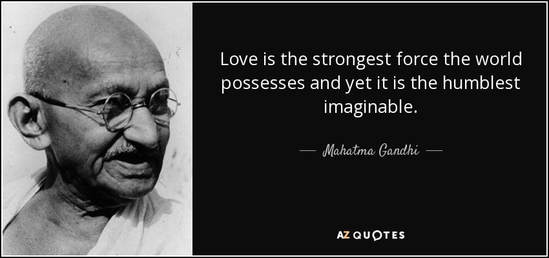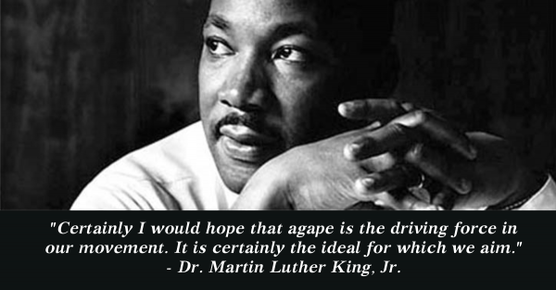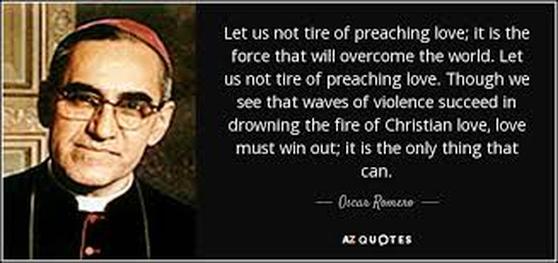
The Agapé Peace Center is dedicated to promote the presence of agapé love in acts of peace and justice, and in church communities. More love-language and more love-action is needed for several reasons. Without love, agendas for social change can veer toward being self-righteous and sometimes can become self-defeating. Without love, church communities can become cold and insular, lacking the capacity to share love beyond their narrow borders because they do not practice enough love within their borders. With doses of love, however, social causes and faith communities can become more relational in their orientation, allowing for better growth, change, and adaptability.
The 13th Chapter of 1 Corinthians, often called the “Love Chapter,” provides a short manifesto for agapé love. The first few verses clearly show how love can be left out of the equation of the highest and noblest forms of human activity: eloquent speech, esoteric knowledge, transformative faith, feeding the poor, even martyrdom,... all of these and more can be done without relational love. One might add “efforts for peace and justice”. Those two words go together so well like “peanut butter and jelly.” But do we stop to think about how agapé love may be integrated into this duet? Can they sing as a trio? Or in church communities, do we stop to consider how the command to “love one another” is the centerpiece of Christian behavior? Is that perhaps too costly?
What exactly is this agapé kind of love all about? Agape love is the selfless, self-giving love that best describes God’s love for humanity. While there are several other Greek terms for love in the New Testament, the word agapé appears 115 times. With such prominence, agapé has become the supreme virtue within the Christian tradition. In contrast, agapé love, though having Greek roots, is rarely presented in classical Greek literature as being a chief virtue. One key aspect of agapé love is that it is volitional more than it is emotional. While all loves stem from an inner sentiment, agapé love is known primarily for its outward expression of goodwill toward another.
C. S. Lewis, in his book, The Four Loves, differentiates between the classic Greek terms for love that appear in the Bible:
1. Storgé -- Affection, Fondness
2. Philéo -- Friendship
3. Eros -- Erotic Love, Romantic Love
4. Agapé -- Charity, Divine Love
Agapé love is not only the greatest love, but also the chief love under which the other three loves can best flourish. If they break free of this subordination, they become more ‘needy’ and self-possessive in their loves toward other people or objects. Evenso, human beings have the capacity to express agapé love in their own relationships with each other. This can be seen, for example, in the way a parent of a young child, at 2 AM in the morning, can sacrifice an hour or two of sleep to comfort their restless or sick child. There is nothing in it for themselves; the parent expends life to give life.
Jesus captured this dynamic well when he said, “Greater love (agapé) has no one than this: to lay down one’s life for one’s friends….This is my command: Love each other” (John 15:13,17). Love in this respect involves humble service to advance the welfare of others. True humility, in this context, has little to do with one’s own estimate of themselves. Humility is rather a relational virtue where the choice to stoop down is done to raise up another. Because this love drove God to take the initiative to rescue humanity, it stands to reason that those who bond with God would mirror the same ‘down-up’ pattern in their relationships with others (see 1 John 3:16).
Here now is a summary of aspects that can be found in agapé love:
What follows is a quote from the First Epistle of Clement, one of the earliest writings from the end of the first century to follow after the writing of the New Testament books.
“Who can explain the bond of God’s love? Who is able to recount the greatness of its beauty? The height to which love leads is beyond description. Love binds us to God; love hides a multitude of sins; love bears all things and endures all things. There is nothing vulgar in love, nothing haughty. Love has no schism, love creates no faction, love does all things in harmony. Everyone chosen by God has been perfected in love; apart from love nothing is pleasing to God” (49:2-5).
We all seem to carry within ourselves a mental habit of differentiating ourselves from other people, especially when they appear to threaten our well-being and when our trust is lessened. And yet, according to Clement, “Love has no schism, love creates no faction.” What a challenge it is to see our true connections with others instead of majoring on our less-than-true disconnections with others. Even our enemies, as Thomas Merton said, hold the same seeds of humanity within them as we hold within ourselves.
Love is indeed a force to reckon with!
The 13th Chapter of 1 Corinthians, often called the “Love Chapter,” provides a short manifesto for agapé love. The first few verses clearly show how love can be left out of the equation of the highest and noblest forms of human activity: eloquent speech, esoteric knowledge, transformative faith, feeding the poor, even martyrdom,... all of these and more can be done without relational love. One might add “efforts for peace and justice”. Those two words go together so well like “peanut butter and jelly.” But do we stop to think about how agapé love may be integrated into this duet? Can they sing as a trio? Or in church communities, do we stop to consider how the command to “love one another” is the centerpiece of Christian behavior? Is that perhaps too costly?
What exactly is this agapé kind of love all about? Agape love is the selfless, self-giving love that best describes God’s love for humanity. While there are several other Greek terms for love in the New Testament, the word agapé appears 115 times. With such prominence, agapé has become the supreme virtue within the Christian tradition. In contrast, agapé love, though having Greek roots, is rarely presented in classical Greek literature as being a chief virtue. One key aspect of agapé love is that it is volitional more than it is emotional. While all loves stem from an inner sentiment, agapé love is known primarily for its outward expression of goodwill toward another.
C. S. Lewis, in his book, The Four Loves, differentiates between the classic Greek terms for love that appear in the Bible:
1. Storgé -- Affection, Fondness
2. Philéo -- Friendship
3. Eros -- Erotic Love, Romantic Love
4. Agapé -- Charity, Divine Love
Agapé love is not only the greatest love, but also the chief love under which the other three loves can best flourish. If they break free of this subordination, they become more ‘needy’ and self-possessive in their loves toward other people or objects. Evenso, human beings have the capacity to express agapé love in their own relationships with each other. This can be seen, for example, in the way a parent of a young child, at 2 AM in the morning, can sacrifice an hour or two of sleep to comfort their restless or sick child. There is nothing in it for themselves; the parent expends life to give life.
Jesus captured this dynamic well when he said, “Greater love (agapé) has no one than this: to lay down one’s life for one’s friends….This is my command: Love each other” (John 15:13,17). Love in this respect involves humble service to advance the welfare of others. True humility, in this context, has little to do with one’s own estimate of themselves. Humility is rather a relational virtue where the choice to stoop down is done to raise up another. Because this love drove God to take the initiative to rescue humanity, it stands to reason that those who bond with God would mirror the same ‘down-up’ pattern in their relationships with others (see 1 John 3:16).
Here now is a summary of aspects that can be found in agapé love:
- Selfless
- Sacrificial
- Self-giving
- Commitment
- Unconditional
- Willed or chosen
- Expressed in action
- Geared toward others
What follows is a quote from the First Epistle of Clement, one of the earliest writings from the end of the first century to follow after the writing of the New Testament books.
“Who can explain the bond of God’s love? Who is able to recount the greatness of its beauty? The height to which love leads is beyond description. Love binds us to God; love hides a multitude of sins; love bears all things and endures all things. There is nothing vulgar in love, nothing haughty. Love has no schism, love creates no faction, love does all things in harmony. Everyone chosen by God has been perfected in love; apart from love nothing is pleasing to God” (49:2-5).
We all seem to carry within ourselves a mental habit of differentiating ourselves from other people, especially when they appear to threaten our well-being and when our trust is lessened. And yet, according to Clement, “Love has no schism, love creates no faction.” What a challenge it is to see our true connections with others instead of majoring on our less-than-true disconnections with others. Even our enemies, as Thomas Merton said, hold the same seeds of humanity within them as we hold within ourselves.
Love is indeed a force to reckon with!





